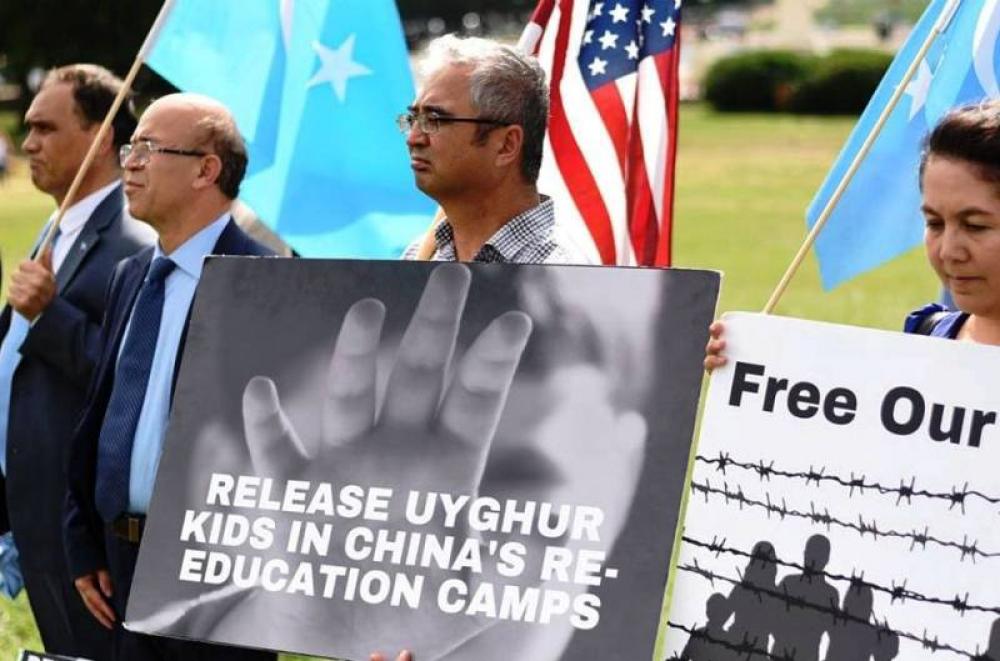Just Earth News | @justearthnews | 02 Sep 2018, 07:23 am Print

World Uyghur Congress
Beijing: Ever since reports have surfaced about China detaining up to a million people in internment camps, mostly from the minority Uyghur community, for adhering to their faith Islam, the country has denied the same.
However, in a rare admission, it has said that some religious extremists have been picked up and sent to camps for re-education, adding that the others enjoy full freedom.
The Communist nation had sent a 50-strong delegation to the two-day meeting of the UN Committee on the Elimination of Racial Discrimination in August.
Responding to the allegations, Hu Lianhe, deputy director of China's United Front Work Department of the Communist Party Central Committee, said: "Xinjiang citizens, including the Uighurs, enjoy equal freedom and rights."
"The argument that one million Uighurs are detained in re-education centres is completely untrue," Lianhe added.
According to Munich-based World Uyghur Congress, the Chinese government has been operating extensive internment camps holding an estimated one million Uyghurs as well as ethnic Kazakhs since early 2017 -- the camps are operated extra-legally as Uyghurs are not charged with any crimes.
Notwithstanding China's statement, a team from the United Nations Committee on the Elimination of Racial Discrimination said that Beijing has turned the Uyghur autonomous region "into something that resembles a massive internment camp".
The team has asked Beijing to stop its practice of detaining people without a fair trial while urging it to release the jailed persons.

It also demanded that Beijing conduct an impartial investigation into all allegations of racial, ethnic and ethno-religious profiling", while providing account on which grounds the detained individuals were booked.
Meanwhile, reports have claimed that such internment camps have doubled in northwestern Xinjiang region in the last one year, which only testifies China's crackdown on religion, mostly Islam.
The mushrooming of such camps have been described as “the largest mass incarceration of a minority population in the world today,” by the U.S. Congressional-Executive Commission on China.
The truth is, China sees religion as an illness.
"Members of the public who have been chosen for re-education have been infected by an ideological illness. They have been infected with religious extremism and violent terrorist ideology, and therefore they must seek treatment from a hospital as an inpatient. … The religious extremist ideology is a type of poisonous medicine, which confuses the mind of the people. … If we do not eradicate religious extremism at its roots, the violent terrorist incidents will grow and spread all over like an incurable malignant tumor," read an excerpt from an official Communist Party audio recording, which was transmitted last year to Uighurs via WeChat, and which was transcribed and translated by Radio Free Asia.
Speaking to The Atlantic, James Millward, a professor of Chinese history at Georgetown University, said that China sees religion as a pathology.
He added that Communist China often believes that religion fuels extremism and separatism.
"So now they’re calling re-education camps ‘hospitals’ meant to cure thinking. It’s like an inoculation, a search-and-destroy medical procedure that they want to apply to the whole Uighur population, to kill the germs of extremism. But it’s not just giving someone a shot—it’s locking them up for months in bad conditions," the professor said.
Those in the camps said that they were tortured- made to consume pork and alcohol- things prohibited in Islam and were forced to pledge allegiance to China's President Xi Jinping.
Tahir Imin, a U.S.-based Uighur academic from Xinjiang, said that it is a crackdown on anyone who is not ethnically Chinese.
"I think the Chinese government is saying: ‘This ideological hospital—in there, send every person who is not [ethnically] Chinese. They are sick, they are not safe [to be around], they are not reliable, they are not healthy people.’,” Imin to The Atlantic.
News of the crackdown has triggered widespread condemnation from international bodies, however, Beijing remains adamant.
It has banned almost anything that remotely resembles the Islam faith, from names to the length of the beard and even removing domes from mosques.
Last month, dissenters took to the streets in the country's Tongxin county, Ningxia Hui Autonomous Region, protesting the authorities' decision to demolish the Weizhou Grand Mosque.

At least two other mosques have had their domes removed earlier this year.
The Chinese government has also removed all Arabic and Islamic signs from the streets.
Commentators have said that it is Beijing's attempt to build a religion-free China.
IMAGES - World Uyghur Congress
- Pakistan: UN experts express concern over lack of protection for minority girls from forced religious conversions, marriage
- Forty percent Pakistanis are currently living below the poverty line, says World Bank
- Hindu girl abducted in Pakistan, community members slam authority
- Thailand's lower house passes bill to legalise same-sex marriage
- UN says 758 allegations of sexual exploitation and abuse registered last year






